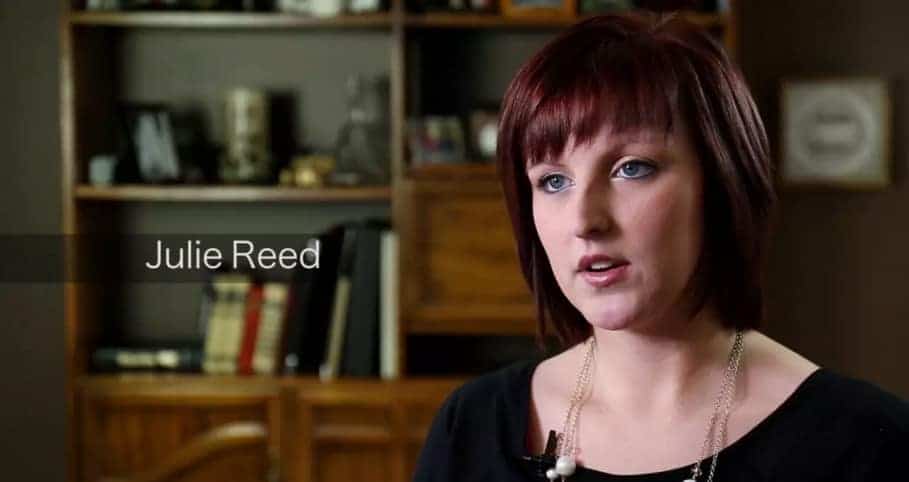Directors and staff at child advocacy centers know their mission is to provide a neutral and safe environment for the children and families that come through their doors. But few CACs likely know exactly what a child is feeling, or precisely what impact they’re having on young lives. Julie Reed, however, is keenly aware of how it feels to be on both sides of the doors.
Reed is the current Elkhart County Child and Family Advocacy Center Director, a role that includes conducting forensic interviews and running the advocacy center.
Reed is also an abuse survivor.
After winning a raffle from local radio station U93 in South Bend during last summer’s Roofsit, Reed had the nudge she needed to publicly and fully tell people about her history. Roofsit is a fundraiser and event to help stop child abuse around Elkhart and St. Joseph Counties. Roofsit boasts $2 million in donations over the last two years, including the donation of video production services from TJ21 Media Group that Reed won from her lucky raffle ticket.
“My husband had been pushing me to find an avenue to tell my story. I never had a problem with sharing what happened to me, but I just hadn’t pursued it,” said Reed. It was then Reed knew she had her platform and the time was right to talk about the half-decade of abuse that has come to shape her entire life. “It’s impacted how I look at my job and I have a more profound feeling of how important this job and this team is that investigates the cases.”
The twenty-minute video is available to view now. In it Reed starts with memories from when she was 12. Living with her younger brother and mother, Reed recalls a new boyfriend of her mother’s and how quickly he came to take over their life. “There was a lot of domestic violence between him and my mother from the very beginning. He came in as a knight in shining armor, but quickly took control of everything from our finances to our schedules.”
Reed’s mother became further removed from the day-to-day operations of the household by working multiple jobs to support the family as the violence continued. Reed acknowledges her mom, “Knew he was a jerk, and in the eight years he was with my mom, he rarely had a job. Mom was focused on just keeping us fed and going to school.” But like many abusive situations, there weren’t many other places to go.
“My family is very small. We only had my mom’s side of the family. [Her boyfriend] hated my grandparents and my uncle from the beginning, too. My grandparents tried to stay in the loop as much as they could, by coming to lunch with us and staying involved in the school as much as [non-custodial] adults could by law,” said Reed.
The beginning of Reed’s healing would come through a support system of a concerned teacher and school counselor. “That was huge for me. I wasn’t disclosing anything, and then I started disclosing small things. They stuck with their gut instinct that something was going on. Which got me to a point where I was ready to fully disclose.” Advice Reed gives to teachers and school staff today when they suspect abuse. “Just be as supportive as possible if you suspect something is wrong. The process of disclosure is just that, a process. It takes time. This may be the first time anyone has asked a kid if they’re okay. The likelihood they’re going to disclose right away is slim to none. Stay supportive, because that’s how it works.”
Once Reed began to disclose information, she was first taken to a child advocacy center, which proved supportive and helpful, but didn’t result in a change in the home. A second visit about a year later resulted in an immediate removal from the home and placement for her and her brother with Reed’s grandparents. “I remember both [Centers] being very welcoming and sensed we were in a safe place,” says Reed. Within nearly the same breath, Reed continues, “I realized then, as a teenager, that what was going on wasn’t my fault. I wasn’t to that point when I was first interviewed, but I was at my breaking point the second time when I was interviewed.”
I realized then, as a teenager, that what was going on wasn’t my fault…
Reflecting on this moment in her life, Reed thought she would soon graduate high school and attend college as far away as possible, perhaps to study law. But the experiences she had with her caseworker and CASA opened her mind to other career possibilities. An internship would change her mind even further. “After studying social work at nearby St. Mary’s College, I didn’t want to work with children for fear it’d be too difficult. But I was put in a position at an internship where I worked with kids, and I was somewhat resentful at first, but quickly realized that working with kids is what I wanted to do. I found I had this natural ability to do so,” says Reed.
Reed volunteered her time her senior year work in parenting classes at CAPS, all while keeping a close eye on job openings there around the time of her graduation. “I applied for two jobs at CAPS. I was interviewed, and let them know upfront my own experience with abuse. I told them I felt like I had healed and they took a chance and hired me. I just found that I love it and I can’t imagine doing anything else. “
Reed is proud to know changes have happened to Indiana’s child protection system. “Knowing how the system works now vs. 12-15 years ago, I have reassurance that the system works better now for kids. I know that had our case been looked at now it would be looked at much different. We wouldn’t have gone through as much because the case would have moved faster.”
Reed recoils at being told her problems amounted to stereotypical teenage angst, too. “I remember when our case was investigated before we were removed [from the home]. I was told I was a spoiled teen that wanted to get away and have a boyfriend. I was getting this from a caseworker, right in front of my mother and her boyfriend. It made me wonder if maybe I really was complaining too much.”
Reed continues, “But I see how cases are handled today. Centralized reporting has helped a lot because everything is shared across jurisdictions. I know that how prosecutors and detectives train for and work cases has a huge impact,” says Reed, adding, “The community’s feelings on these topics affects how reporting happens, too. It affects how juries sentence, and how caseworkers handle cases.”
Without skipping a moment in her cadence, Reed has clear instructions for young people in a similar situation today, saying, “I’ll tell kids and teens this: if you’re being abused and the first person you tell doesn’t listen, keep telling someone until they do something about it.”
Today, Reed lives with her own kids and husband, whom she met in 5th grade. “I’m a firm believer that this experience is the reason why I am where I am today. Had I not gone through what I did, I may not have met my husband or I may not have been in this career,” adding, “I told myself I could be a victim or a survivor, and I chose to be a survivor.”

